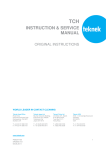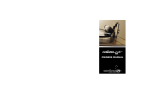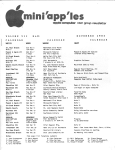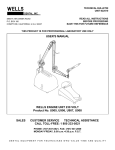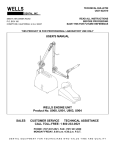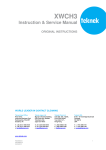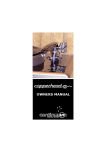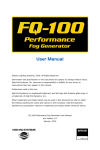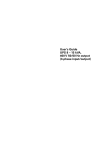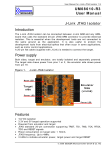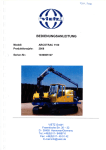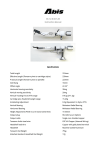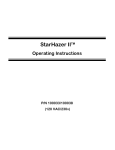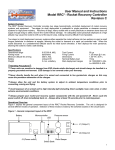Download Caliburn Turntable Installation Manual
Transcript
Caliburn Turntable Installation Manual REVISION ‘D’ Continuum Audio Laboratories – Caliburn Installation Manual Welcome and congratulations on your purchase of the Caliburn turntable system. Your Caliburn was hand-crafted and assembled by the team at Continuum Audio Laboratories, and has been rigorously tested and is ready for your enjoyment. We ask that you take the time to read this manual carefully to ensure that you not only enjoy optimum sound quality from your Caliburn, but also understand the care and maintenance procedures required to keep your Caliburn in as-new condition for many years to come. If you have any questions in reference to any part of your Caliburn at any time in the future, please feel free to contact your nearest Continuum Consultant for assistance. Your Authorised Continuum Consultant is: Serial Number: Date of Manufacture Written By: MDO Approved By: PLO Revision D – 01-JUN-08 Page 2 of 52 Continuum Audio Laboratories – Caliburn Installation Manual TABLE OF CONTENTS IMPORTANT INFORMATION AND NOTES...................................................................................5 WHO SHOULD READ THIS MANUAL ...........................................................................................5 HOW TO READ THIS MANUAL ......................................................................................................5 Standard Symbols and Safety Notifications ....................................................................................5 SAFETY PRECAUTIONS..........................................................................................................................6 CALIBURN SYSTEM COMPONENTS.............................................................................................7 CALIBURN TURNTABLE...............................................................................................................7 CALIBURN CONTROL UNIT ........................................................................................................7 CALIBURN VACUUM UNIT..........................................................................................................7 CASTELLON ISOLATION STAND.................................................................................................7 COBRA TONEARM ........................................................................................................................7 OVERVIEW OF BASIC INSTALLATION STEPS .........................................................................................9 PACKAGING ................................................................................................................................10 INSPECT PACKAGING PRIOR TO OPENING...........................................................................10 OPEN THE PACKAGING ............................................................................................................10 CASTELLON OVERVIEW ............................................................................................................11 CASTELLON LAYERS ..................................................................................................................12 INSTALL LOWER CERAMIC SHELF ..........................................................................................13 INSTALL UPPER CERAMIC SHELF GUIDE BOLTS.................................................................13 INSTALLING THE DAMPING & BALLAST LAYERS..................................................................16 CONTROL BOX............................................................................................................................18 VACUUM BOX .............................................................................................................................18 INFLATION OF THE HORIZONTAL STABILISER.....................................................................19 CALIBURN TURNTABLE .................................................................................................................20 OVERVIEW OF BASIC INSTALLATION STEPS..........................................................................21 PACKAGING CONTENTS ..............................................................................................................22 PLATTER ASSEMBLY ..................................................................................................................22 CHASSIS, BEARING, ARMBOARD ASSEMBLY..........................................................................23 MOTOR ASSEMBLY.....................................................................................................................25 CONTROL BOX ASSEMBLY........................................................................................................26 CONTROL BOX – FITTING OF SEALED BATTERIES ..............................................................27 VACUUM BOX ASSEMBLY .........................................................................................................28 SET - UP INSTRUCTIONS.................................................................................................................29 PREPARING THE CHASSIS BEFORE INSTALLATION.............................................................29 PLACING THE TURNTABLE CHASSIS ......................................................................................29 PLACING THE TURNTABLE CHASSIS ......................................................................................30 PREPARING THE BEARING FOR PLATTER INSTALL ..............................................................33 OUTER PLATTER INSTALLATION ..............................................................................................34 INSTALLING THE INNER PLATTER ............................................................................................35 INSTALLING THE BELT ................................................................................................................38 PLACING THE TOP COVER...........................................................................................................39 INSTALLING THE PERIPHERALS ................................................................................................40 INSTALLING THE ARM .................................................................................................................41 CALIBURN OPERATING INSTRUCTIONS ..................................................................................42 PLATTER CLAMP AND LIP SEAL OPERATION........................................................................42 RECORD PLAYING PROCEDURE ................................................................................................43 OPERATING THE VACUUM.......................................................................................................43 STARTING THE MOTOR .............................................................................................................43 REMOVING RECORD PROCEDURE .........................................................................................43 SPEED ADJUSTMENT ....................................................................................................................44 LOWERING THE SPEED.............................................................................................................44 RAISING THE SPEED..................................................................................................................44 CONFIRMING THE SET SPEED.................................................................................................44 OWNER CARE & MAINTENANCE ...............................................................................................45 CARING FOR METAL SURFACES..............................................................................................45 CLEANING THE PLATTER .........................................................................................................45 BEARING MAINTENANCE..........................................................................................................45 Written By: MDO Approved By: PLO Revision D – 01-JUN-08 Page 3 of 52 Continuum Audio Laboratories – Caliburn Installation Manual MOTOR.........................................................................................................................................45 MOTOR BELT REPLACEMENT..................................................................................................45 FAULTS & TROUBLE SHOOTING ................................................................................................46 SPECIFICATIONS............................................................................................................................47 CALIBURN’S DESIGN HISTORY ..................................................................................................48 APPENDIX 1 – RECOMMENDED BATTERY DETAILS .........................................................................50 Written By: MDO Approved By: PLO Revision D – 01-JUN-08 Page 4 of 52 Continuum Audio Laboratories – Caliburn Installation Manual IMPORTANT INFORMATION AND NOTES ENGLISH WE RECOMMEND YOU READ THIS DOCUMENT IN ITS ENTIRETY BEFORE ATTEMPTING TO ASSEMBLE OR DISASSEMBLE YOUR NEW TURNTABLE. WHO SHOULD READ THIS MANUAL This manual is designed for the owner, dealer, or dealer representative who will install the Caliburn turntable. The reader should have a good general knowledge of mechanical devices and be proficient with basic tools such as allen wrenches, spirit levels, and general assembly techniques for machined components. HOW TO READ THIS MANUAL The User manual (this manual) contains important notes that need to be observed to operate the Caliburn safely and correctly. Throughout this manual there will be standard symbols denoting important information. Standard Symbols and Safety Notifications For your safety and that of others, follow the guidelines provided on the following pages concerning the use of the product. Symbols are used throughout this manual. These are provided to emphasize important points for your safety and that of others. The following are the symbols and their meanings: Ignoring the instructions under this symbol when installing or dismantling the Caliburn may be hazardous or even lethal. Ignoring the instructions under this symbol when installing or dismantling the Caliburn may lead to injuries as well as damage to the device or hardware options. CAUTION (CAUTION without the exclamation mark) Ignoring the instructions under this symbol when using the Caliburn may lead to damage to the device or hardware options. Written By: MDO Approved By: PLO Revision D – 01-JUN-08 Page 5 of 52 Continuum Audio Laboratories – Caliburn Installation Manual Safety Precautions Category Electric shock and fire Do not dismantle or modify this device in any other way than described in this manual. Do not place anything on top of this device. Doing so may cause fire, electric shock or a malfunction. Do not install this device in direct sunlight, near a heater, or in a humid or dusty environment. Doing so may cause fire or electric shock. To prevent fire or shock hazard, do not expose this unit to rain or moisture. Do not use or allow any liquid cleaning solutions to enter the unit. Do not obstruct the ventilation slots. This could cause overheating and fire. Use only a certified safe AC adapter and power cable to connect to any IEC connectors on the provided Power Entry Modules. Third-party adapters and cables may cause fire, electric shock or malfunction. In the event the device overheats, starts to smoke or smells strange, immediately unplug the device completely from the AC power plug. Contact the company where you purchased the device immediately. Using the device in its current condition may cause fire or electric shock. Do not damage or modify the power or other cables. Do not twist the cables together, place anything on them or place them where someone may trip over them. Doing so may cause fire or electric shock or personal injury. The Power Supply contains voltages that can cause serious injury or death. There are no user serviceable parts inside and no reason to open the control box or the pump box. In situations of failure return to approved dealer or agent. Should any solid object or liquid fall into the cabinet, unplug the unit and have it checked by your Factory Authorized Dealer To avoid electrical shock, do not open the cabinet. Refer servicing to qualified personnel only. Before operating the unit, check that the operating voltage is identical with your local power supply. The operating voltage is indicated on the name plate at the rear of the unit on the Power Entry Module. The unit is not disconnected from the AC power source (mains) as long as it is connected to the wall outlet, even if the unit itself has been turned off. If you are not going to use the unit for a long time, be sure to disconnect the unit from the wall outlet. To disconnect the AC power cord, grasp the plug itself; never the cord. AC power cord must be changed only at a qualified service shop. Fitting components The components in the Caliburn are made to close tolerances with sliding fits on most bearing surfaces. Never over tighten any of the provided fasteners for assembling the platter. If you are in doubt request the assistance of a trained dealer representative to ensure no forcing or misalignment of the components during assembly. Observe all instructions on placing your hands in the correct location when installing the heavy platter on to the bearing. Failure to observe the instructions and commonsense may result in injury. Written By: MDO Approved By: PLO Revision D – 01-JUN-08 Page 6 of 52 Continuum Audio Laboratories – Caliburn Installation Manual CALIBURN SYSTEM COMPONENTS The Caliburn consists of separate subsystems that combine to create a most sophisicated analogue playback system. CALIBURN TURNTABLE The Caliburn turntable is a precisely engineered piece of equipment designed to be a low noise foundation for the record to sit, allowing the stylus to extract the maximum information from the record’s groove. CALIBURN CONTROL UNIT The Caliburn Control Unit allows for platter speed selection, 33, 45 and 78, and speed adjustment/memory settings. It also controls the vacuum unit for precise negative pressure to hold the record down during playback. CALIBURN VACUUM UNIT The Caliburn Vacuum Unit is a super quiet pump with a “stealth-mode” operation during playback. It is a computer controlled negative pressure mechanism that maintains correct vacuum for record playback. It runs continuously during playback. CASTELLON ISOLATION STAND The Castellon Isolation Stand is specifically designed to support the Caliburn Turntable and provide a suspension system that is tuned to the Caliburn. It contributes a significant proportion to the sound of the system. COBRA TONEARM As the primary tonearm on the Caliburn System the Cobra offers unparalleled performance even against very complicated linear mechanisms. It has been designed to work as part of the overall system to deliver a complete sonic result. Written By: MDO Approved By: PLO Revision D – 01-JUN-08 Page 7 of 52 Continuum Audio Laboratories – Caliburn Installation Manual Castellon Stand Written By: MDO Approved By: PLO Revision D – 01-JUN-08 Page 8 of 52 Continuum Audio Laboratories – Caliburn Installation Manual Overview of Basic Installation Steps Perform the steps below to install the Castellon. Details are contained in this manual. 1. Read the User Manual (this manual) ↓ 2. Unpack and Check the contents of the packaging ↓ 3. Confirm location for Castellon installation ↓ 6. Position and place the Castellon. Level the Stand using the adjustable feet ↓ 7. Remove protective packing film ↓ 8. Remove Top Drawer ↓ 9. Install the Lower Ceramic Shelf and Upper Ceramic Shelf using Special Bolts ↓ 10. Install Pneumatic Buffer around Upper Ceramic Shelf ↓ 11. Place Damping Sheets onto Upper Ceramic Shelf ↓ 12. Place Top Timber Shelf on Damping Sheets ↓ 13. Install Caliburn ↓ 14. Release Installation Bolts ↓ 15. Secure Safety Bolt ↓ 16. Inflate Buffer Written By: MDO Approved By: PLO Revision D – 01-JUN-08 Page 9 of 52 Continuum Audio Laboratories – Caliburn Installation Manual PACKAGING Please retain all the packaging in a safe dry place away from fire hazard and/or pests which could damage the packaging materials. Should you need to transport the turntable we strongly recommend you use the original packaging to prevent damage during shipment. Never transport the turntable with the platter assembled as this will potentially lead to serious damage to the bearing and platter. INSPECT PACKAGING PRIOR TO OPENING The packaging has been especially designed so that all component parts are safe during transportation by reputable shipping companies. Should the packaging appear damaged or show signs of having been exposed to significant amounts of moisture (buckled cardboard packaging or heavy water stains) please advise your dealer immediately as the contents may have been exposed to undesirable events. The packaging is designed to handle the majority of expected shipping conditions but there may be instances where events beyond Continuum Audio Laboratories control have occurred in shipping. To avoid complications with warranty claims we recommend you contact your dealer for assistance in evaluating the packaging prior to unpacking and installation. OPEN THE PACKAGING The standard packaging consists of custom made roadcases and triple walled cardboard boxes containing foam lining to protect the components. Use a suitable protected cutting implement to carefully release the packaging tape holding the protective boxes. Then remove each component. Note: the parts are heavy and require a firm careful grip to remove the items from their packaging. Be careful not to drop these components. Ask for assistance before lifting heavy objects should you feel this is necessary. Place each component in a safe place (i.e a soft surface such as a towel or soft blanket) before opening the next component. Written By: MDO Approved By: PLO Revision D – 01-JUN-08 Page 10 of 52 Continuum Audio Laboratories – Caliburn Installation Manual CASTELLON OVERVIEW The Castellon is a very specialised design incorporating the latest technology in vibration control. The stand contains a negative stiffness mechanism which works in harmony with the Caliburn to produce unequalled sonic results. This spring mass damper system are hidden beneath the attractive exterior. Aircraft grade alloys are used throughout along with high tension turnbuckle systems to rigidly brace the stand from any spurious movement. Convenient features such as the drawer mechanism allow for storage of the usual collection of tools and cleaning needs of quality analogue systems. Custom Finish Top High Tension Turnbuckles Custom Finish Drawer Custom Middle and Lower Shelf Side Bracing Ring Ceramic Adjustable Feet Written By: MDO Approved By: PLO Revision D – 01-JUN-08 Page 11 of 52 Continuum Audio Laboratories – Caliburn Installation Manual CASTELLON LAYERS Once you have installed the stand in the correct location you need to insert the various shelf components, ceramic levitating shelves, ballast metal sheets and damping material sheets. Custom Finish Top Damping Material Sheets Horizontal Pneumatic Stabiliser. Inflation valve centered at rear. Ballast 3MM Metal Sheets Upper Ceramic Levitating Shelf Lower Ceramic Levitating Shelf Main Safety Bolt Central Cutout For Inflation Valve Written By: MDO Approved By: PLO Revision D – 01-JUN-08 4 x M10 Allthread Assembly Clamping Guide Bolts with Plate Washers and Wingnuts Page 12 of 52 Continuum Audio Laboratories – Caliburn Installation Manual INSTALL LOWER CERAMIC SHELF Carefully lower the Bottom Ceramic Levitating Shelf into the recess in the top of the stand. Secure at each corner with the supplied M6 x 20MM Socket Head Cap Screws. Tighten all the bolts after ensuring each bolt has been started without crossthreading. M6 X 20MM SHCS Bolts 2 in each corner INSTALL UPPER CERAMIC SHELF GUIDE BOLTS Thread the 4 x M10 Allthread Assembly Clamping Guide Bolts into the inside corners of the UPPER Ceramic Shelf. Ensure these are flush with the top face of the Ceramic Shelf. Lower into the stand allowing the Guide Bolts to locate the top shelf evenly through the opposing holes in the LOWER Ceramic Shelf. Written By: MDO Approved By: PLO Revision D – 01-JUN-08 Page 13 of 52 Continuum Audio Laboratories – Caliburn Installation Manual Secure the flat plate washers and wingnuts as shown. Install the Pneumatic Horizontal Stabilizer (do not inflate at this stage) by wrapping it around the outer edge of the UPPER Ceramic Shelf. Ensure the inflation valve is centered at the rear of the Castellon Stand inline with the cutout. Tighten the allthreads in sequence to pull the UPPER Ceramic Shelf gradually and evenly into the recess in the Castellon. DO NOT REMOVE THESE BOLTS UNTIL THE CENTRAL SAFETY BOLT HAS BEEN INSTALLED. Written By: MDO Approved By: PLO Revision D – 01-JUN-08 Page 14 of 52 Continuum Audio Laboratories – Caliburn Installation Manual Install the Safety Bolt and tighten this until it is flush with the top surface. Written By: MDO Approved By: PLO Revision D – 01-JUN-08 Page 15 of 52 Continuum Audio Laboratories – Caliburn Installation Manual INSTALLING THE DAMPING & BALLAST LAYERS Install the alternating layers of damping material and ballast metal sheets in the following order: After Ceramic UPPER Shelf Secured into stand A. B. C. D. E. F. 1 1 1 1 1 1 x x x x x x 3MM Damping Sheet (EPDM Rubber) 3MM Ballast Metal Sheet . 3MM Damping Sheet (EPDM Rubber) 3MM Ballast Metal Sheet . 1.5MM Damping Sheet (EPDM Rubber) Custom Finished Top Cap Written By: MDO Approved By: PLO Revision D – 01-JUN-08 Page 16 of 52 Continuum Audio Laboratories – Caliburn Installation Manual Remove the M10 Allthread Guide Bolts to allow clear room for the Drawer Mechanism: YOU MUST ENSURE SAFETY BOLT REMAINS INSTALLED. THIS IS TO PREVENT THE LEVITATION SYSTEM FROM RELEASING INADVERTENTLY SHOULD SOMEONE REMOVE THE CALIBURN TURNTABLE OFF THE STAND WITHOUT FOLLOWING PROPER INSTRUCTIONS INSTALL THE DRAWER MECHANISM Written By: MDO Approved By: PLO Revision D – 01-JUN-08 Page 17 of 52 Continuum Audio Laboratories – Caliburn Installation Manual CONTROL BOX THE CONTROL BOX IS USED TO SET SPEEDS, TURN VACUUM AND LOGO LIGHT ON/OFF. We recommend this is installed in the middle shelf of the Castellon VACUUM BOX THE VACUUM BOX IS USED TO DELIVER NEGATIVE PRESSURE FOR VACUUM HOLDDOWN. We recommend this is installed in the lower shelf of the Castellon Written By: MDO Approved By: PLO Revision D – 01-JUN-08 Page 18 of 52 Continuum Audio Laboratories – Caliburn Installation Manual INFLATION OF THE HORIZONTAL STABILISER Once the Caliburn has been fully installed on to the Castellon a settling procedure is required to centralize and level the levitating ceramic shelves. Use the supplied manual inflation pump to add about 5-6PSI of low pressure to provide a “rolling” buffer to the UPPER Ceramic Shelf. You may need to push repeatedly up and down on the shelf to equalize the pressure around the periphery of the shelf. Additional fine positioning of the Caliburn Motor and Chassis will help evenly distribute and balance the suspension system. Periodic checking of the pneumatic buffer is recommended (3-6month cycle). Add pressure using the pump if required. Written By: MDO Approved By: PLO Revision D – 01-JUN-08 Page 19 of 52 Continuum Audio Laboratories – Caliburn Installation Manual Caliburn Turntable Written By: MDO Approved By: PLO Revision D – 01-JUN-08 Page 20 of 52 Continuum Audio Laboratories – Caliburn Installation Manual OVERVIEW OF BASIC INSTALLATION STEPS Perform the steps below to install the Caliburn. Details are contained in this manual. 1. Read the Caliburn Installation Manual (this manual) ↓ 2. Unpack and Check the contents of the packaging ↓ 3. Confirm location for installation ↓ 4. Confirm the location of the Control Box and Vacuum Box installation ↓ 5. Position and install the Castellon Stand ↓ 6. Position and place the Motor and Pucks for Mounting Feet ↓ 7. Position and place the Caliburn Chassis ↓ 8. Install the Outer Platter and Inner Platter ↓ 9. Install the Belt ↓ 10. Install the Top Plate ↓ 11. Connect the cables and vacuum hoses ↓ 12. Connect the AC power adapter (IEC Mains Plug) ↓ 13. Turn on the power ↓ 14. Test Operations ↓ 15. Install the Tonearm ↓ 16. Start Operations and Playback Written By: MDO Approved By: PLO Revision D – 01-JUN-08 Page 21 of 52 Continuum Audio Laboratories – Caliburn Installation Manual PACKAGING CONTENTS THERE ARE 6 MAIN COMPONENTS WHICH COMPRISE THE CALIBURN TURNTABLE SYSTEM Roadcase 1 – Roadcase 2 – Box 3 – Box 4 – Box 5 – Box 6 - Platter, Chassis, Bearing, Motor, Top Plate and assembly parts. Castellon Stand Assembly and Shelving Castellon Heavy Upper Ceramic Shelving Castellon Heavy Lower Ceramic Shelving Vacuum Box including Cables and Hoses Control Box including Cables PLATTER ASSEMBLY 1 1 4 1 1 1 x x x x x x Record Clamp Record Vacuum Cap Seal M5 x 20MM Inner Platter Bolts Titanium Spindle Protector Inner Platter with Lip Seal and O’ring installed Outer Platter with O’ring installed Written By: MDO Approved By: PLO Revision D – 01-JUN-08 Page 22 of 52 Continuum Audio Laboratories – Caliburn Installation Manual CHASSIS, BEARING, ARMBOARD ASSEMBLY 1 4 1 3 3 x x x x x Chassis with Bearing and Armboard Assembly M4 x16MM Tonearm Mounting Bolts Custom Veneer finished Top Mounting Feet (must be threaded into chassis before placing chassis on stand) Mounting Feet Pucks TOP OF CHASSIS SHOWING LOCATION OF BEARING AND ARMBOARD UNDERSIDE OF CHASSIS SHOWING LOCATION OF 3 ADJUSTABLE FEET Written By: MDO Approved By: PLO Revision D – 01-JUN-08 Page 23 of 52 Continuum Audio Laboratories – Caliburn Installation Manual TOP PLATE 3 x ADJUSTABLE MOUNTING FEET AND MATCHING PUCKS NOTE: EACH ADJUSTABLE FOOT HAS A SMALL CONICAL CENTER UNDER EACH FOOT. EACH PUCK HAS A CORRESPONDING CONE WHICH IS USED TO SUPPORT THE FOOT. WHEN THE TWO COMPONENTS ARE INSTALLED CORRECTLY THE ADJUSTABLE FOOT IS ABLE TO ROTATE ON THE CONE OF THE PUCK. THIS IS LIKE A REVERSE “SPIKE”. The Chassis and Main Bearing come fully assembled with integral armboard pre-drilled for Cobra Tonearm Installation. Open Inner box and remove chassis from packaging. Carefully remove cling film protective wrap. Do not worry about fingerprints and other wrapping marks. These will be removed with a final cleaning when fully assembled. Unpack 3 x Adjustable Feet and install on the underside of the chassis. Keep the 3 corresponding pucks free for placement on to the Castellon stand you will lower the chassis onto later. Written By: MDO Approved By: PLO Revision D – 01-JUN-08 Page 24 of 52 Continuum Audio Laboratories – Caliburn Installation Manual MOTOR ASSEMBLY D15 Connector to Control Box J1 1 x Motor System 1 x Motor to Control Box Cable From Motor to Control Box (D15 Connector must be connected before lowering chassis over motor) 2 x Pyrathane “O” Ring Belts Written By: MDO Approved By: PLO Revision D – 01-JUN-08 Page 25 of 52 Continuum Audio Laboratories – Caliburn Installation Manual CONTROL BOX ASSEMBLY THE CONTROL BOX IS USED TO SET SPEEDS, TURN VACUUM AND LOGO LIGHT ON/OFF. Front View Logo Light Button – Used to turn the turntable illumination light on/off is located on the side of box VAC Button – Used to select vacuum on/off Speed Lower Button – Used to adjust or set speed Speed Raise Button – Used to adjust or set speed Rear View FACTORY USE ONLY Speed Buttons - Used to select desired speed Spare Connectors Unused On / Off Note: Ensure Correct Voltage is set before operation! J5 VAC Cable to Vacuum Box J1 IEC Power Entry Module Note: Select Voltage correct J4 TT Cable to Back of Turntable Earthing Attach Point J1 Platter Drive Cable to Motor Base 1 1 1 1 x x x x Control Box Link Cable Control Box to Vacuum Box (J5 to J1 Connector) Link Cable Control Box to Turntable Chassis Rear Panel (J4 to Epic 12Pin Rear TT Chassis) Link Cable Control Box to Motor Base (J1 to D15 Motor Connector) Written By: MDO Approved By: PLO Revision D – 01-JUN-08 Page 26 of 52 Continuum Audio Laboratories – Caliburn Installation Manual CONTROL BOX – FITTING OF SEALED BATTERIES . Ignoring the instructions under this symbol when installing or dismantling the Caliburn may be hazardous or even lethal. THIS CONTROL UNIT REQUIRES BATTERIES TO BE INSTALLED BEFORE OPERATION. THE CONTROL BOX REQUIRES 2 x 12Volt Lead Acid Batteries of minimum 3AH rating to be connected for 24Volts total DC output. DO NOT OPERATE THIS UNIT WITHOUT CONTACTING YOUR AUTHORISED CONTINUUM DEALER TO ENSURE THE CORRECT FITMENT OF BATTERIES HAS BEEN CARRIED OUT. DO NOT ATTEMPT TO OPEN THE CONTROL BOX. THERE ARE NO USER SERVICEABLE PARTS INSIDE. ONLY CONTINUUM FACTORY TRAINED AND AUTHORISED TECHNICIANS ARE ALLOWED TO FIT BATTERIES. ENSURE ALL STATIC DISCHARGE PRECAUTIONS ARE OBSERVED AS FAILURE TO PROTECT THE DEVICE FROM STATIC CHARGES CAN DAMAGE SENSITIVE PARTS AND VOID WARRANTY. 1. 2. 3. 4. 5. 6. 7. 8. Disconnect all Power from the rear of the Control Box Remove the Control Box Lid Locate Bolts and Clamps and secure batteries as shown Procure 2 off 12Volt4.2AH/20HR Non-Spillable Sealed Rechargeable Batteries (Pb type) with small terminals for easy fitment. Dimensions each battery no to exceed 90mm L x 70mm W x 110mm H. See Appendix 1 in this manual for Recommended Battery details Connect Terminal Leads Positive (White) and Negative (Black) and Central Jumper Strap (12V + 12V=24V). Note: Depending on local battery supplier, the terminal leads may need to be adjusted or lengthened to reach the attachment location. Remove any cable ties which limit the length of the leads so as to extend reach of cables. Resecure the lid and ensure correct voltage is eselected on the IEC power entry module. Connect all cables to Caliburn Chassis, Pump Box and Motor Connect IEC Power source and test operation. 12V Sealed Rechargeable Batteries Written By: MDO Approved By: PLO Revision D – 01-JUN-08 Page 27 of 52 Continuum Audio Laboratories – Caliburn Installation Manual VACUUM BOX ASSEMBLY Front View Rear View Earthing Attach Point Oil Recovery 6mm Tube to Rear of TT Chassis Blue Connector Vacuum 6mm Tube to Rear of TT Chassis Grey/Green Connector J1 Connector to J5 On Control Box 1 x Vacuum Box 2 x 6MM Vacuum and Oil Recovery Hose (2 meters) THE VACUUM BOX IS USED TO DELIVER NEGATIVE PRESSURE FOR VACUUM HOLDDOWN AND PROVIDE OIL PRESSURE FOR THE HYDROSTATIC MAIN PLATTER BEARING. Written By: MDO Approved By: PLO Revision D – 01-JUN-08 Page 28 of 52 Continuum Audio Laboratories – Caliburn Installation Manual SET - UP INSTRUCTIONS The Caliburn should be installed on a firm level surface with a free space of 615mm x 500mm for the best results. This surface must be capable of withstanding a load of 100Kg’s safely. Please consult your dealer for recommendations on suitable stands. PREPARING THE CHASSIS BEFORE INSTALLATION Before placing the Caliburn onto the stand a few steps must be carried out to prepare the bearing. 1. 2. 3. Remove any blanking plugs Check Oil Level Insert Bearing Shaft into Bronze Bush Remove 25MM Rubber Bung from Bearing Bush. Remove 2 x 6MM Blanking Plugs from Rear of Chassis Oil Recovery and Vacuum Fittings Note: Store these plugs in a safe place for future shipping Note: Store this rubber bung in a safe place for future shipping Blanking Plug Main Bearing Shaft 25 MM Rubber Bung Tapered BEARING INSTALLATION Unwrap and inspect the Main Bearing Shaft Ensure all bearing surfaces are free of contamination. Use a clean lint free cloth (TekWipes recommended) to wipe mating surfaces clean. Check inside the well of the Bronze Bush to ensure the Chrome Thrust ball is installed at the bottom. Carefully align the shaft and the bearing and lower the main shaft into the bearing bush keeping the shaft parallel and concentric. CAUTION These close tolerance surfaces should Main Bronze Bush not be forced together. Use a gentle twisting motion to “feel” or “tickle” the bearing into place. If you feel a jamming force immediately stop and undo your action. Push down once the shaft starts to slide smoothly into the bearing well. Any air and oil will gradually displace with firm downward pressure. Written By: MDO Approved By: PLO Revision D – 01-JUN-08 Page 29 of 52 Continuum Audio Laboratories – Caliburn Installation Manual PLACING THE TURNTABLE CHASSIS Procedure for placing the turntable: 1. Place the motor and 3 Pucks as shown below. Ensure the motor cable is pointing to the rear of the intended position for the turntable chassis. Rear of Chassis this way. Ensure D15 Cable is attached and secured prior to lowering chassis over motor Written By: MDO Approved By: PLO Revision D – 01-JUN-08 Page 30 of 52 Continuum Audio Laboratories – Caliburn Installation Manual CAUTION 2. Connect the 6MM Vacuum Hose (Black) to the pneumatic fitting on the rear of the chassis. This is a swivel fitting with a simple push connect fitting. Firmly push the hose into the fitting for sealing. In the event that you need to remove the hose, push the small locking collar in whilst simultaneously pulling on the hose to free it from the fitting. Never pull on the hose without depressing the collar first as the connector is designed to resist this force. 12 Pin Epic Connector TT to Control Box J4 6mm Oil Recovery Hose Connector to Pump Box Blue Fitting Written By: MDO 6mm Vacuum Hose Connector to Pump Box Grey/Green Fitting Approved By: PLO Revision D – 01-JUN-08 Page 31 of 52 Continuum Audio Laboratories – Caliburn Installation Manual 3. Request the assistance of an able bodied helper to lift and place the turntable chassis over motor and feet as shown. Take care to avoid knocking the motor housing when lowering the chassis over the motor housing. Motor Installed correctly. Ensure all sides are not touching any part of the chassis 4. Move the pucks under the 3 adjustable feet to locate the centre “spike” on each puck into the matching recess under each adjustable foot. The “spike” will leave a few millimetres of space between the foot and the puck when correctly installed. 5. Level the turntable chassis with a suitable spirit level. Be careful not to mark or scratch any external finishes. Use a small circular bubble level for best results. Written By: MDO Approved By: PLO Revision D – 01-JUN-08 Page 32 of 52 Continuum Audio Laboratories – Caliburn Installation Manual PREPARING THE BEARING FOR PLATTER INSTALL 6. Ensure O’Rings are installed and undamaged. 7. Prepare bearing for platter installation by applying supplied silicon grease to the bearing shaft. The supplied grease is designed to ease the lowering of the larger outer platter onto the bearing shaft and shaft seals. Use a soft cloth or paper towel to scoop a teaspoon amount of grease and smear this over the shaft as shown (see picture below). Indicated area to coat Bearing Shaft and twin o-ring seals evenly with approx 1 teaspoon of supplied Silicon grease Twin o-ring Bearing Seals Greasing the bearing shaft 8. Wash your hands to ensure they are free from oil and grease before continuing with platter installation. Written By: MDO Approved By: PLO Revision D – 01-JUN-08 Page 33 of 52 Continuum Audio Laboratories – Caliburn Installation Manual OUTER PLATTER INSTALLATION Failure to place your hands in an area with clearance may result in personal injury. 9. Lift the heavy outer platter (34Kg) and whilst holding the platter as flat and parallel to the chassis base as possible, gently place over the bearing shaft as shown. You must place your hands diagonally in the empty areas near the front and rear of the chassis (as shown in picture below) to ensure your fingers have clearance to lower the platter. 10. Carefully move your hands away from the underside of the platter to retain your grip on the side s. This will protect your fingers as the platter is lowered against the bearing base. 11. Gently push down to seat the platter over the two o-ring seals on the bearing shaft. These seals will give a little resistance at first but the platter weight will quickly “pop” past these seals when pushed from above. Make sure you keep your fingers in the clear areas shown. Written By: MDO Approved By: PLO Revision D – 01-JUN-08 Page 34 of 52 Continuum Audio Laboratories – Caliburn Installation Manual INSTALLING THE INNER PLATTER 12. Check underside of the inner platter to ensure o-ring seal is in place (this can sometimes dislodge during shipping) Check to ensure O’Ring is Installed 13. Check top seal of the outer platter to ensure o-ring seal is in place. This was installed at the factory. Ensure it is in place. If replacement is required install a spare seal as shown (seals are available from your factory authorised dealer or service agent). Check to ensure O’Ring is Installed Written By: MDO Approved By: PLO Revision D – 01-JUN-08 Page 35 of 52 Continuum Audio Laboratories – Caliburn Installation Manual 14. Remove the small 7MM titanium spindle protector and screw the supplied Record Clamp in its place. This Record Clamp will allow you to lift and lower the inner platter on to the outer platter safely. 7MM Titanium Spindle Protector Record Clamp Written By: MDO Approved By: PLO Revision D – 01-JUN-08 Page 36 of 52 Continuum Audio Laboratories – Caliburn Installation Manual 15. The inner platter can now be placed over the outer platter and located on the centre “boss”. Push the inner platter down firmly and rotate the four central holes to align with the matching threads in the main bearing. 16. Next, remove the Record Clamp to expose the four central platter to bearing mounting (M5) holes. Check the alignment of the holes and rotate the inner platter by placing your palms on top of the platter surface and then moving your hands in a circular motion until the holes line up. Align these holes with bearing mounting (M5) holes Holes lined up Written By: MDO Approved By: PLO Revision D – 01-JUN-08 Page 37 of 52 Continuum Audio Laboratories – Caliburn Installation Manual 17. Locate 4 x M5 x 20mm platter bolts and place them into the matching holes near the centre of the inner platter. 18. Gently align these bolts and start the threads being careful not to cross thread. 19. Tighten these bolts by criss-crossing the bolt pattern and evenly tightening each opposing bolt. We recommend you use the short end of the hexagonal allen wrench first to avoid over torquing each screw during the initial tightening procedure. Then use the long end of the allen wrench to apply final tightening torque. INSTALLING THE BELT 20. Locate one of the supplied pyrathane belts and loop this around the outer platter and once around the opposing motor pulley. Keep one hand on the pulley as you guide the belt down the grooves of the platter until the pulley groove and platter groove are in alignment. You may have to adjust the height of the feet under the chassis to ensure groove alignment is complete. The Caliburn design is quite forgiving of minor misalignments but your endeavour to get this as true and parallel will assist with accurate motion control. Written By: MDO Approved By: PLO Revision D – 01-JUN-08 Page 38 of 52 Continuum Audio Laboratories – Caliburn Installation Manual PLACING THE TOP COVER 21. Locate the top plate. Whilst holding the top plate, position the cutout for the tonearm to align with the armboard position. Gently lower the top plate over the platter being careful not to touch the platter edges. Align the edges to fit in the chassis rebate and lower the top plate down into the rebate. No further attachments are necessary as the plate is designed to “float” in the chassis. It provides a shield for the armboard. Written By: MDO Approved By: PLO Revision D – 01-JUN-08 Page 39 of 52 Continuum Audio Laboratories – Caliburn Installation Manual INSTALLING THE PERIPHERALS 22. Locate and install the Control Box and Pump Box in the Castellon stand to suit your location of a phono stage or preamplifier. 23. Locate the dedicated cabling and 6MM Vacuum Hoses and connect the cabling and hoses according to the labelled connectors found on the rear of each box. Each cable connection is unique to prevent misconnections. Ensure Vacuum Hose connections follow labelled pathway. 24. Connect IEC AC mains power cable once all other connections are in place. 25. Turn Mains Power on. 26. Check for operation by pressing the logo light button on the front panel of the Control Box. The Caliburn Chassis Light should be on or off depending on toggle status. Written By: MDO Approved By: PLO Revision D – 01-JUN-08 Page 40 of 52 Continuum Audio Laboratories – Caliburn Installation Manual INSTALLING THE ARM 27. Locate and install the tonearm base (depending on your choice of tonearm). Align the tonearm to ensure all mounting parameters are correct. See separate Cobra tonearm manual for details. Written By: MDO Approved By: PLO Revision D – 01-JUN-08 Page 41 of 52 Continuum Audio Laboratories – Caliburn Installation Manual CALIBURN OPERATING INSTRUCTIONS Now that your Caliburn turntable has been installed and fully optimized it is now ready for you to enjoy. Please take a moment to familiarize yourself with the basic controls for operating your Caliburn. These are located on the front of the Control Box PLATTER CLAMP AND LIP SEAL OPERATION The Caliburn Platter system offers both vacuum and manual clamping options to secure the LP evenly onto the platter surface. Provided Record Clamp and Spindle Seal can be used alone or in combination to secure the LP before and during playback. Additionally there is a Titanium Record Spindle Hole Protector. This is for playing very special collector edition vinyl records where resale values may be affected if the hole in the centre of the LP record is marked. To protect this hole use the Titanium Record Spindle Hole Protector before placing the LP on the surface of the platter. Unscrew the protector before using the Record Clamp or leave it in place if you only want to use the Spindle Seal on its own. The Record Clamp is a threaded clamp. Threaded clamps can exert significantly more pressure than a vacuum alone on an LP. Never over-tighten the Record Clamp as damage to the LP may occur. A light pressure is all that is required to press the LP against the platter surface. Never try to undo the seal whilst the LP is playing as this may lead to damage to the spindle thread and other bearing and motor related components. Record Clamp Titanium Record Spindle Hole Protector Record Center Spindle Seal for Vacuum Outer Record Lip Seal for Vacuum Inner Platter for LP support Written By: MDO Main Outer Platter Approved By: PLO Revision D – 01-JUN-08 Page 42 of 52 Continuum Audio Laboratories – Caliburn Installation Manual RECORD PLAYING PROCEDURE Note: Clean equipment and clean media is a necessary prerequisite to ensure the Caliburn will give you the best performance every time. Set the master amplifier volume control close to its minimum setting to avoid damaging your speakers. Ensure that the platter surface on the turntable is clean and dust free, and clean the record to be played on both sides, using a suitable dust remover. Place the record on the platter, ensuring the black outer sealing rubber ring is evenly placed around the rim of the record so as to create optimum negative pressure when the vacuum is turned on. Place the record spindle seal and clamp over the center of the record to ensure the label is sealed. OPERATING THE VACUUM Press the Vacuum button on the Caliburn Control Unit to the “ON “ position. The LED will light up. The record is drawn down to the platter within a few seconds. Use the supplied vacuum spindle seal to secure the record to the spindle. Vacuum Button STARTING THE MOTOR Next, select the required play speed by pressing the corresponding button on the Control Unit - 33, 45 or 78. The LED will light up. The motor will start and the platter will start to spin at the selected speed. Wait about ten seconds for the platter speed to stabilize, then place the stylus arm gently on the record and enjoy the programme. REMOVING RECORD PROCEDURE Set the master amplifier volume control close to its minimum setting to avoid any damaging your speakers. Gently remove the stylus arm from the record and place it on its rest position. Press the selected speed button (LED will be on) on the Control Unit to stop the motor and platter from spinning (LED will turn off). Press the Vacuum button on the Control Unit to turn the vacuum off (LED will turn off). The record slowly rises up away from the platter within a few seconds. Wait about ten seconds, then remove clamp and spindle seal. The record can now be removed from the platter. Written By: MDO Approved By: PLO Revision D – 01-JUN-08 Page 43 of 52 Continuum Audio Laboratories – Caliburn Installation Manual SPEED ADJUSTMENT The Caliburn turntable has one of the most advanced motion control systems that today’s technology can provide. The turntable is fitted with a drive motor fully integrated with electronic control to maintain the speed to preset values within a Micro controller. To adjust or set the turntable playing speeds via “SPEED LOWER & SPEED RAISE” push buttons. Speed Lower Speed Raise Place a speed calibration strobe disk (available from quality hi-fi suppliers) on the platter, following the previously mentioned record playing procedure, and select the platter speed button of the desired speed to be adjusted i.e. 33, 45 or 78. Simultaneously press “Speed Lower” and “Speed Raise” push buttons on the Control Unit and hold down for more than 5 seconds. Both LED’s will flash once to show the Speed Control Computer is now in adjustment mode. Release the push buttons and begin lowering or raising the speed as described below. LOWERING THE SPEED To lower the speed of the Platter, push the “Speed Lower” button. This will cause the platter speed to reduce by 0.1 r.p.m. each time it is pressed. Holding down the Speed Lower button continuously will cause a more rapid adjustment. Once you have set the desired speed, you must wait 45 seconds, with no further adjustments to store the setting into the Control Box memory as the new user default. Should you wish to make further speed changes, repeat the Speed Adjustment procedure. RAISING THE SPEED To Raise the speed of the platter push the “Speed Raise” push button on the Control Unit. This will cause the platter speed to increase by 0.1 r.p.m. each time it is pressed. Holding down the Speed Raise button continuously will cause a more rapid adjustment. Once you have set the desired speed, you must wait 45 seconds, with no further adjustments to store the setting into the Control Box memory as the new user default. Should you wish to make further speed changes, repeat the Speed Adjustment procedure. CONFIRMING THE SET SPEED Once you have set the desired speed, you must wait 45 seconds, with no further adjustments to store the setting into the Control Box memory as the new user default. Should you wish to make further speed changes, repeat the Speed Adjustment procedure. Written By: MDO Approved By: PLO Revision D – 01-JUN-08 Page 44 of 52 Continuum Audio Laboratories – Caliburn Installation Manual OWNER CARE & MAINTENANCE Your Caliburn turntable is a delicate piece of equipment, and care needs to be taken when using and cleaning it. Below are recommendations for keeping your Caliburn at its optimum performance. CARING FOR METAL SURFACES The metals chosen because of their superior sound qualities are soft, and care should be taken when using your Caliburn. Make sure there are no sharp objects on or near that could scratch the metal surfaces. Clean with a soft camera-lens-quality cleaning chamois. Do not use any window cleaning solutions, silicon based polish, abrasive pads, scouring powder or solvents such as alcohol or benzene to clean your Caliburn. Your Continuum Consultant can advise you on what products available in your area are suitable to use for cleaning. CLEANING THE PLATTER The platter can be cleaned using a soft, camera-lens-quality, cleaning chamois. BEARING MAINTENANCE The bearing is fully enclosed and requires no owner maintenance under normal operating conditions for temperature and humidity. If you hear any unfamiliar noise coming from your Caliburn, turn the unit off immediately and contact your Continuum Consultant. Note: The Nested Platter design isolates the Platter surface from the bearing and will help prevent rumble from transmitting to the LP surface. MOTOR The motor is sealed and can only be serviced by an Authorised Continuum Agent. Warranty will be void if seal is broken. MOTOR BELT REPLACEMENT Replacement belts are available. We recommend you contact your Continuum Consultant if you need an additional belt. 2 belts are supplied with your Caliburn. Written By: MDO Approved By: PLO Revision D – 01-JUN-08 Page 45 of 52 Continuum Audio Laboratories – Caliburn Installation Manual FAULTS & TROUBLE SHOOTING Before reporting any faults please ensure the following items are checked. 1. Have you connected all the hoses and cables securely? 2. Have you connected the power and turned the switch on the back of the Pump Box on? 3. Have you checked that the belt is installed (and has not slipped off) 4. Have you leveled the unit correctly? 5. Is the motor clear of the chassis and platter? 6. Have you adjusted the speeds using the calibration procedure? 7. Is the surface of the platter free of debris and dust? 8. Is the rubber seal clean? The Caliburn is designed for robust operation and should be fault free for the life of the unit. If the bearing has been damaged during installation by incorrected platter install then problems may occur. These out of the norm issues are the responsibility of the user and will not by our Warranty. Written By: MDO Approved By: PLO Revision D – 01-JUN-08 Page 46 of 52 Continuum Audio Laboratories – Caliburn Installation Manual SPECIFICATIONS CALIBURN TURNTABLE • 33, 45, 78 RPM Selectable from Control Box • Ability to support 2 tonearms simultaneously • Unique Magnetically Isolated Armboard Technology • Integrated Castellon Isolation Stand with Unique Magnetic Damping • 350 kg fully assembled PLATTER • 38 kg Nested Platter Design for Ultra Low Noise Operation. BEARING • Unique Oil Pressurised Hydrostatic Bearing for highly damped super stable operation. • Solid one-piece, centre ground steel alloy with high pressure bearing outer using ceramic coatings such silicon nitride and tungsten bisulpide in nano-technology lubricants VACUUM • Super quiet pump mechanism with “absolute stealth-mode” operation during playback. • Computer controlled, negative pressure mechanism to maintain minimum vacuum for record playback. MOTOR • Computer-controlled high-torque with TRUE ZERO cogging DC Brushless Sinusoidally Commutated Motor configured for 3 Phase AC Synchronous operation. • Integrated Optical Encoder with high line count for quadrature encoding. • 600 oz-in. peak torque • High efficiency • 12–48 VDC Written By: MDO Approved By: PLO Revision D – 01-JUN-08 Page 47 of 52 Continuum Audio Laboratories – Caliburn Installation Manual CALIBURN’S DESIGN HISTORY Passion is a powerful force; shared passion is twice as powerful. Mark Doehmann, Caliburn’s designer, believed his passion for analogue sound was unmatched, until he met David Payes. Mark Doehmann has been building custom turntables for a select clientele since 1982. These turntables aimed to solve the particular problems of each system, by trading off advantage against disadvantage in an attempt to create a balance Mark knew, to his frustration, was ultimately a compromised solution. Compromise he accepted as inevitable in his quest for the purest analogue sound possible. David Payes is a well-respected Australian businessman and a passionate audiophile. During the installation of a highly regarded turntable onto David’s system and the subsequent evaluation of the results, David asked Mark, if money was no object, what would he do to improve the turntable. Thinking in terms of this being a theoretical conversation, Mark nominated the platter as the first thing he would change. David response was ”Ok, do it”. So began the first step in the long and challenging process of developing the critically acclaimed Caliburn Cobra Castellon system. Mark’s ultimate aim when imagining the perfect platter was to create a silent foundation for the record to sit, to allow the stylus to extract the maximum information from the record’s groove. Mark realized to create his vision would require some very sophisticated engineering. With his background in aeronautical engineering, Mark called upon the expertise of some of his colleagues from this field. A unique alloy formula to address the stiffness and damping of the platter was developed with the help of materials engineer John Vietz. Using the most advanced shape optimization computer technology Dr. Neil McLachlan developed the optimum shape for the first prototype of the Caliburn to reduce vibration to an absolute minimum. After months of complex computer modelling, Mark returned to David Payes with the Caliburn’s nested platter design and rather nervously replaced the existing platter and sat back with David to listen to the results. It was obvious to both of them that there was a marked improvement in the sound they were hearing. The nested platter design matched the predicted computer modelling results, and was delivering real-world results. David then asked, if this was possible with a re-design of the platter alone, what could be achieved if this same rigorous design process was applied to all the components of a turntable? This same process of development was now applied to every aspect of a turntable. The chassis, the bearing, the motor were all designed with a back-to-the-drawing-board approach. Written By: MDO Approved By: PLO Revision D – 01-JUN-08 Page 48 of 52 Continuum Audio Laboratories – Caliburn Installation Manual THE CALIBURN IS THE FRUIT OF COLLABORATION Many very intelligent minds were brought together to push the envelope of what was imagined possible for turntable technology, and we would like acknowledge each one of them now. Mark Doehmann – Director Engineering and Development Marks’ passion for analogue sound reproduction combined with his background in aeronautical and advanced software engineering and materials fabrication techniques was used to transform his vision from the “virtual world” to the end product. David Payes - Chairman, Continuum Audio Labs David was the catalyst for the development of the Caliburn, and created the financial and creative freedom to push the envelope. David is a passionate audiophile and has had extensive input with technical design issues. Dr Murali Murugasu MB.ChB. MBA – CEO Murali is part of the core design team at Continuum Audio Labs. His day to day involvement ensures that our products meet various regional market requirements and ensures that they works in harmony with other high quality components to deliver a complete solution. Joe Persico - Bachelor of Engineering (Electrical), Advanced Vacuum & Logic Control. Joe developed the Caliburn’s unique vacuum control mechanism and computer controlled subsystems. Arthur Rappos - Bachelor of Engineering (Electrical), Advanced Motor & RF circuit design Arthur’s understanding of RF circuit design and noise control was used to extract maximum performance from several new technologies used in the Caliburn’s design. John Loton - Bachelor of Engineering (Aeronautical) Physics & Structures Design. John was instrumental in the “challenging process” where original “seed ideas” were subjected to an intense peer review process. John Vietz - Bachelor of Engineering (Metallurgical) – A recognized leader in his field, John developed Caliburn’s unique magnesium alloy which gives Caliburn it’s high damping characteristics. Dr. Neil McLachlan – Associate Professor of Engineering at Melbourne University Neil worked closely with Mark on the reshaping and acoustic modelling and design, and developed new and innovative solutions to the some very old problems associated with analogue sound reproduction. Michail Barabasz - Bachelor of Engineering (Electrical), Advanced Magnetic Design. – An expert in magnetic circuit design and voice coil engineering, Michail developed the unique magnetic propulsion system to levitate and drive the platter. Dr. Nigel Ricketts - Principal Research Scientist CSIRO Manufacturing & Infrastructure Technology, Brisbane. Nigel was consulted to resolve various metallurgical casting issues to ensure the magnesium properties we specified were transferred to the end product. Prof. Josef Tomas - Reshape Software and Mechanical Engineering Design. – Josef created the Reshape™ software that allowed us to move resonances inherent in the Caliburn’s shape into regions where they could be controlled and managed. Dr. Glen Wolff - Advanced Systems Engineering. Glen expertise was sought to deal with the complex use of organic materials and their application on the Cobra. Written By: MDO Approved By: PLO Revision D – 01-JUN-08 Page 49 of 52 Continuum Audio Laboratories – Caliburn Installation Manual APPENDIX 1 – Recommended Battery Details We recommend the YUASA brand of Sealed Lead Acid Batteries for use in the Caliburn Control Box. Please use the NP4-12 Type battery with the Type “A” Terminal size for ease of installation. Please procure 2 of these NP4-12 batteries to create the necessary 24Volts of DC power (i.e 12V + 12V = 24V) Specifications are shown below: Written By: MDO Approved By: PLO Revision D – 01-JUN-08 Page 50 of 52 Continuum Audio Laboratories – Caliburn Installation Manual Written By: MDO Approved By: PLO Revision D – 01-JUN-08 Page 51 of 52 Continuum Audio Laboratories – Caliburn Installation Manual Written By: MDO Approved By: PLO Revision D – 01-JUN-08 Page 52 of 52





















































